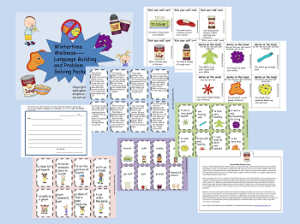
Vocabulary Intervention: Working With Disadvantaged Populations


 Today’s guest post on working with middle school students comes from Zoya Tsirulnikov, MS CCC-SLP, TSSLD , an SLP from the NYC’s Department of Education.
Today’s guest post on working with middle school students comes from Zoya Tsirulnikov, MS CCC-SLP, TSSLD , an SLP from the NYC’s Department of Education.
The middle school population is fun and exciting to work with, however it may prove to be quite challenging for some SLPs. This is my fifth year working for the New York City Department of Education at the Middle School level. I started out working with high school and elementary school students and quickly realized that this particular age group is different from its younger and older counterparts. Whereas at the elementary grades, students are learning new skills and concepts and building the foundation for expository text, the middle school students are expected to have bridged over to more rigorous text. Therefore, the achievement gap is very noticeable since students are tackling more de-contextualized discourse. Continue reading Guest Post: Forming and Cultivating Positive Relationships with Middle School Students
 Today’s giveaway Food Category Sorting is brought to you courtesy of The Speech Summit.
Today’s giveaway Food Category Sorting is brought to you courtesy of The Speech Summit.
This cute 26 page activity involves sorting: fruits, vegetables, desserts, meat, and drinks.
It includes:
picnic boards to sort each categories
food items on 3 ½ x 3′ cards
picnic themed game boards
pages of food themed tokens
An interactive game which targets category sorting and vocabulary building activities is also included. For those who don’t want to use the game you can use food cards and picnic boards for strengthening listening comprehension and verbal expression by sorting the food items into the correct categories as well as naming items in correct categories. You can find this item in Speech Summit’s TPT store HERE or you can enter below for a chance to win your copy.
a Rafflecopter giveaway
 Today I am doing a product swap and giveaway with Rose Kesting of Speech Snacks. Rose runs a fun and unique blog. In her posts she combines her interest in nutrition and healthy cooking with her professional knowledge as a speech-language pathologist. I’ve collaborated with Rose in the past on a variety of projects and have always been impressed with the quality of her speech and language products, which are typically aimed at language remediation of older children (upper-elementary, middle school and high school ages). Continue reading Wintertime Wellness Product Swap and Giveaway
Today I am doing a product swap and giveaway with Rose Kesting of Speech Snacks. Rose runs a fun and unique blog. In her posts she combines her interest in nutrition and healthy cooking with her professional knowledge as a speech-language pathologist. I’ve collaborated with Rose in the past on a variety of projects and have always been impressed with the quality of her speech and language products, which are typically aimed at language remediation of older children (upper-elementary, middle school and high school ages). Continue reading Wintertime Wellness Product Swap and Giveaway

I love book companion packs! Honestly I can’t get enough of them!
One of the reasons I particularly enjoy using them is because they nicely supplement thematic language therapy activities (see Twin Sister’s Post HERE on thematic therapy). This is why I jumped at the opportunity to review Speech Universe’s If You Give A Mouse A Cooke Phonemic Awareness Packet.
Phonemic Awareness activities are incredibly important for young (Pre-K-1st grade) language impaired learners. They are especially important for children from low SES households as well as young limited English proficiency learners.
Jen’s packet is terrific at addressing a number of phonemic awareness skills including:
Today I am a reviewing a new vocabulary app created by the Virtual Speech Center called Real Vocabulary Pro. Developed to target the core curriculum vocabulary of K-5th grade students, it has tons tons of pictures and pre-recorded audio to target various vocabulary concepts as well as allows users to add their own words, pictures and audio recordings for a more individualized and targeted therapy sessions. Continue reading Real Vocabulary App Review and Giveaway


“The importance of thorough pediatric orofacial assessments in speech pathology: It’s not just for speech sounds anymore” will be published in the online edition of Advance for Speech Language Pathologists and Audiologists on November 16, 2011.
Article Summary: This article explains the importance of documenting orofacial assessment findings for multidisciplinary referral and diagnosis purposes. It offers several personal clinical case examples of atypical orofacial findings, which let to subsequent medical diagnosis of neurological and genetic disorders. It also explains why in some select circumstances, SLP’s may be the first professionals to observe/record atypical findings.
